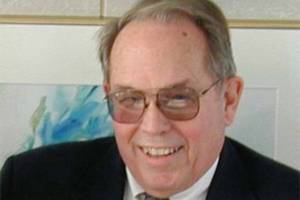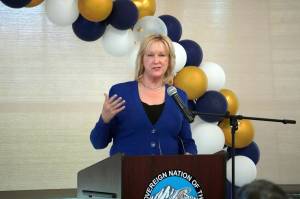Voices of Alaska: Safe oil transportation in Prince William Sound: Are we really so far apart?
Published 5:46 pm Monday, March 12, 2018
If you’ve ever owned horses, you probably know that cleaning the barn first thing in the morning is good for the soul. I use that time to think. Recently, before going out to take care of my four-legged friends, I started pondering the Prince William Sound Regional Citizens’ Advisory Council’s recent resolution, the response from industry, and had a good shovel session to sift through it all.
For those who may not be aware, in January the council passed a resolution stating that oil tankers and escort vessels should not be permitted to transit through Prince William Sound and into the Gulf of Alaska in weather conditions which have been determined by industry to be unsafe for training.
Some have focused on the differing viewpoints between the council and industry. In truth, we are more in alignment than not. We both want the highest level of safety within the oil spill prevention and response system for Prince William Sound. We agree that crew safety is the first priority. Alyeska Pipeline Service Company has also committed to training new crews to demonstrate tanker escorts in a variety of weather and sea conditions in the Sound.
Our resolution is a request for industry to determine their safe limits of training, clearly define them, and then evaluate the need to limit laden tanker transits through Prince William Sound and into the Gulf of Alaska to those same weather conditions.
Crews must experience the full range of operating conditions in which they are expected to perform. If not, how can we expect them to respond to a real event in adverse conditions when their lives, as well as the economic and environmental health of our communities, may be on the line?
In 2004, I was the chief engineer on board the Crowley tug, Nanuq, during an exercise near Hinchinbrook Entrance conducted through Alyeska’s Ship Escort/Response Vessel System, or SERVS. Weather conditions ranged up to 12-foot seas and 40 knots of wind. The Nanuq had been in Valdez for four years before that exercise. By that time the crew worked efficiently as a team and had complete confidence in the captain and the vessel. At no point did I feel that we were exposed to undue risk.
That exercise, including two tugs and a fully laden oil tanker, was to demonstrate the ability of the escort tugs to arrest a disabled tanker in higher winds and rougher sea states, which we successfully accomplished. However, the other tug had a winch motor failure while recovering the towline from the tanker.
It is a heck of a lot better to discover equipment limitations during an exercise than in an actual emergency. Such lessons learned from this drill influenced Crowley escort vessel operations in rough weather, resulting in a safer escort system.
Drills and exercises in the Sound are well-planned events with many safeguards. They can and should be stopped at any time that the risk to crews or vessels becomes unacceptably high. The council recommends a tiered system of exercises, beginning in calm conditions and advancing to the level industry deems the safe limit. Classroom and simulator trainings are valuable, but they can’t take the place of real-world experience on the deck of a vessel.
I was there when Crowley brought into service then-new escort vessels in 1999. Thinking back on that time as I shoveled away in the barn, some thoughts came to the forefront about the current marine services contractor transition. As in 2000, the escort system in Prince William Sound is going to be vastly improved with new vessels arriving soon, to begin service by July. They will have more horsepower, higher bollard pull, and the constant tension winch systems that have been advocated for by the council for years. Alyeska and their new contractor, Edison Chouest Offshore, have put state-of-the-art equipment into these vessels, which is to be commended.
At the same time, we need to recognize that all new vessels have a period of adjustment before they become a fine-tuned piece of equipment. Any time a system goes through transition, in any industry, risk is introduced. This is especially true for a transition of this magnitude, happening in such a tight timeframe.
I have found that an efficient crew starts with competent people – well-trained, professional mariners, learning a new vessel as a team. Just as in any good relationship in life, getting to know a vessel does not happen overnight. It takes time.
The council’s resolution is by no means an effort to delay oil shipping or put crew members in harm’s way. We are simply asking for a safe path forward for Edison Chouest’s crews to learn their vessels, the expected escort tasks, and the conditions in which they have to operate, during non-emergency situations.
Alyeska’s oil spill prevention and response system is one of the best in the world. This system was created through the hard work and dedication of industry, regulators, elected officials, and citizens working together to develop solutions and promote improvements.
We all want the same thing – to prevent oil spills, and have the best response system possible should prevention measures fail. Coordination between all parties is critical to maintain a high level of oil spill prevention and response, and to make sure an accident like the 1989 Exxon Valdez oil spill never happens again. I’m proud of my 22 years of service working on SERVS vessels in Prince William Sound and look forward to Edison Chouest’s crews developing that same pride in Prince William Sound in the coming years.
The council’s resolution and accompanying position paper detailing further information and history on this topic can be found at www.pwsrcac.org.
Robert Archibald represents the city of Homer on the Prince William Sound Regional Citizens’ Advisory Council board of directors and has lived in Homer since 1984. Archibald spent 48 years as a mariner, including service in the U.S. Coast Guard and 32 years as chief engineer on Crowley Marine Service vessels in various locations, before retiring in 2014.




